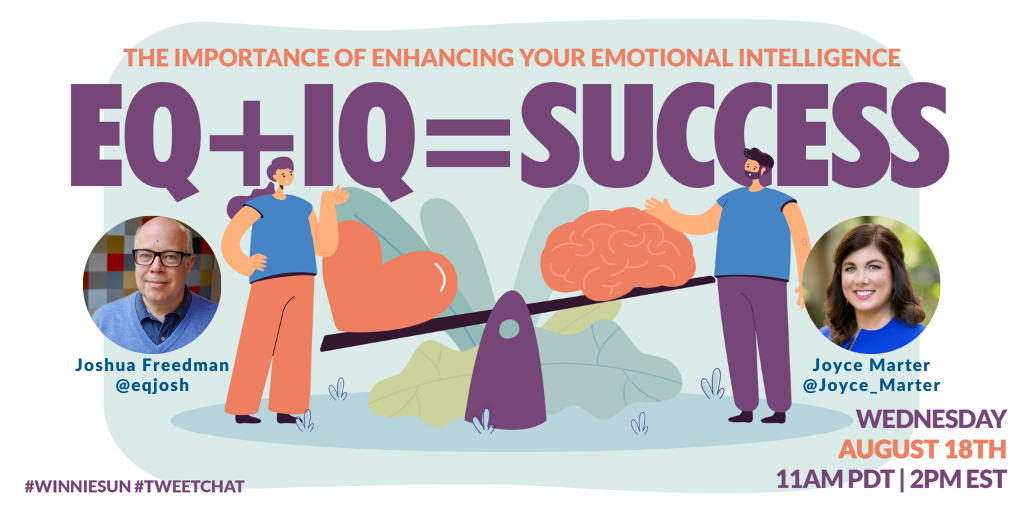Eq+ IQ =Success
To stay updated for more content like our Twitter Chats, follow @WinnieSun! Have a question for Winnie? Use the #AskWinnie to get your questions answered!
Emotional intelligence is essential to your business. Approaching your company’s operations without sufficient EQ can be costly: you may lose significant relationships, waste your time, and even face legal repercussions.
That’s why it’s so important to prioritize building your emotional quotient. Regularly exercising your emotional intelligence in the workplace can promote effective communication, boost social and cultural sensitivity, and foster strong, supportive relationships. These factors are instrumental in building a successful work environment, where people feel like they want to do their best and will do their best.
We’ve invited expert panelists Joshua Freedman @eqjosh and Joyce Marter @Joyce_Marter to share the importance of EQ to your personal and professional life as well as advise you on how to up your emotional intelligence.
Missed the Tweet Chat? Here’s a recap:
Q1. What is emotional intelligence / emotional quotient and why is it so important? What are some examples of emotional intelligence? How do you know your current emotional intelligence score?
Joshua Freedman: What is emotional intelligence: Being smarter with feelings. More technically: Accurately acquiring emotional data to use it to effectively solve challenges. Why is it so important? In part, because we're behind. EG, most of us have 1000s of hours of formal learning about using our mathematical intelligence... hopefully #winniesun team have even more hours! But how many hours of careful learning have you had about feelings? What we know: Emotional intelligence is learnable. It's correlated with good outcomes for adults & kids, including effectiveness, wellbeing, relationships & quality of life. And, that translates to PERFORMANCE - see https://6sec.org/cases for a ton of cases. In terms of how to measure it, @6s_EQ publishes the worlds' best emotional intelligence assessment -- because it's ACTIONABLE, profound, but simple. And, you can try it for free!! http://6sec.org/freeprofile This provides a light way to start, and then go deeper
Joyce Marter: Agreed! Empathy is the magic wand in relationships and the key to EQ. EQ is so important because our relationships are the key to success both personally and professionally. EQ is the ability to regulate your emotions while staying empathically attuned to others and successfully managing the communication through conscious compassion.
***
Q2. What is the 1st step in preparing to improve your emotional intelligence? How do you get comfortable with your own emotional quotient? How do you practice EI for higher self-awareness/self-improvement? How does EI fit in your plans for personal growth?
Joshua Freedman: OMG I feel another thread coming on :) #winniesun the first step is VALUE. Do you really see emotions (yes, all of them) as something valuable?
That's tough in a world where "happy = good" and all other feelings... meh. To grow emotional intelligence, the #1 essential is: Practice.
That's why @6s_EQ's goal is a billion people practicing EQ.
How do you practice? It's a 3 step process, super easy to learn, takes a lifetime to do it consistently and well.
Steps to follow…
EQ Practice Step 1 - Know Yourself
Tune in. Get the data. Hey!! You're feeling something, how interesting!!
What else are you feeling?
How are you reacting?
Dig in and discover.
EQ Practice Step 2 - Choose Yourself
Pause. Move out of autopilot & expand the options.
What else COULD I be feeling? Thinking? Doing?
What are these feelings really teaching me... What are some more options of how to respond? I have choices!! Wheee! EQ Practice
Step 3 - Give Yourself Now that I've done 1 & 2, I've got awareness & options... what am I gonna use those for?
Time to connect BEYOND MYSELF - using empathy & my Noble Goal... what do I TRULY want?
What actually matters? Step toward that, do it again.
In the @6s_EQ Model of Emotional Intelligence, it's a cycle ... every spin of the wheel is a new practice.You can get great tips and guidance on this from https://6sec.org/eq
Joyce Marter: Mindfulness practices help me detach from ego and connect with my essence and foster intuition needed for EQ. Psychotherapy, counseling, coaching and training help. Cultivating EQ is an ongoing process.
Suzanne Brown @mompowerment: As simple as it seems, the golden rule of treating others as you wish to be treated can help with your EQ. Consider how it feels to be in the other person's situation to understand how to treat that person. It's a simple idea in theory but it can be hard in practice.
***
Q3. Everyone has stressful moments in life. How do you think having an enhanced understanding of emotional intelligence can help you manage stress when faced with obstacles, setbacks, etc.?
Joyce Marter: EQ helps use notice when we are stressed so we can raise a mental red flag and realize if we are overreacting. Realizing we are stressed lets us know it's time to practice self-care and access support so our stress doesn't negatively impact our relationships at home and work. EQ helps us view stressors with a growth mindset so we can see them as opportunities for learning and building resilience.
***
Q4. What is social awareness in the realm of EI? How can improving your emotional intelligence help you build better social awareness and social skills to be more attuned to your team, friends, family, and community? How do you better connect and build more empathy?
Joshua Freedman: More than that -- we literally Can Not Make Decisions Without Emotions!
It's how our brains work. Logic makes the list. Emotion adds the weight - this one matters.
Joyce Marter: Cultural and social awareness are an essential aspect of EQ as is the desire to be an advocate for social justice for all. Celebrating diversity in the workplace and in your personal relationships is a way to build social awareness. Being open to considering other ways of thinking leads to increased EQ and insight.
***
Q5. Communication's more than just talk. (Or, more appropriately with WFH employees, text.) What are the best tips for effective communication when in person vs communicating via email, etc.? What are the pros & cons to each? How do you circumvent the cons?
Joshua Freedman: I know that I tend to skip emotion (yes). So, on email / text, after I write my answer, I go back and look... "Was there some emotional message here I could respond to? Did I miss emotional clues?" Then I add some of that love, and send. Remember you're not that great of an actor. People might not know EXACTLY what's going on with you, but when you're feelings @)@()#(@!!@ and say, "oh yah, I'm fine" they know you're lying... and that undermines trust.
Joyce Marter: Being rooted in the present moment, emotionally regulated and aware of how your message may be received with others are so important for effective communication and EQ.
***
Q6. Every team would like smooth collaborations and remarkable results! But how do you create an emotionally-intelligent team that can achieve these goals? What team-building practices and experiences do you use to increase your team’s EQ synergy?
Joshua Freedman: Normalize conversation about emotions. Get a little more real. Still workplace appropriate, but have the courage to increase authenticity. Hire and develop people's EQ (ask me how) Build a shared vocab for talking about the emotional part of your work.
Joyce Marter: Mindfulness in the workplace programming builds EQ. Also providing training on EQ, effective communication and conflict resolution. EQ in a team starts at the top. Lead by example with conscious and compassionate communication and conflict resolution.
***
Q7. While conflict can be inevitable, it takes two to tango. What are the most effective steps for de-escalating a situation? How can you exercise mindfulness and your enhanced EI to promote empathy, more effectively problem-solve, and eventually resolve conflicts?
Joshua Freedman: The key to emotional intelligence and conflict? Remember that the conflict is actually emotional, the underlying needs are emotional. The solutions are emotional.
Joyce Marter: Listen. Be empathic and reflect understanding. Avoid defensiveness. Demonstrate respect & kindness. Be mindful of your body language, facial expression and tone of voice. Healthy detachment (a mindfulness strategy) can help us remain well and grounded without getting hooked and becoming reactive. Zoom out for greater perspective.
***
Q8. Bring more unity to your community! What practices can encourage the improvement of EI as a collective? What are the benefits and importance of cultural sensitivity & awareness within your communities? What effect do you think EI has on inclusion & diversity?
Joshua Freedman: The intersection of emotional intelligence and equity is big and important. "You can't spell Equity without EQ"
--> Systems of oppression isolate us from self & others; so feeling and sharing emotions is an act of liberation. Here's a SUPER fab way to engage people in growing emotional intelligence - POP-UP Festival in partnership with UNICEF World Children's Day
Join people from 200 countries in sharing these skills, all free! Also worth noting, sadly, global levels of EQ dropped during 2020 :( So, we're in a time and place where emotional intelligence is SUPER needed, but also harder to find. Data is here: https://6seconds.org/2021/06/23/pandemic-emotional-intelligence/…
Joyce Marter: EI improves inclusion, openness, and compassion which can be healing and also promote much needed positive change in our communities. We are stronger together.
As Joshua and Joyce have both shared, building your emotional intelligence is a lifetime process, one that reaps invaluable social, personal, and professional benefits. Like other lifelong skills, your EQ is something that can constantly be improved, so keep on practicing with the methods suggested by our expert panelists. Keep striving to grow into a better, keener YOU!


